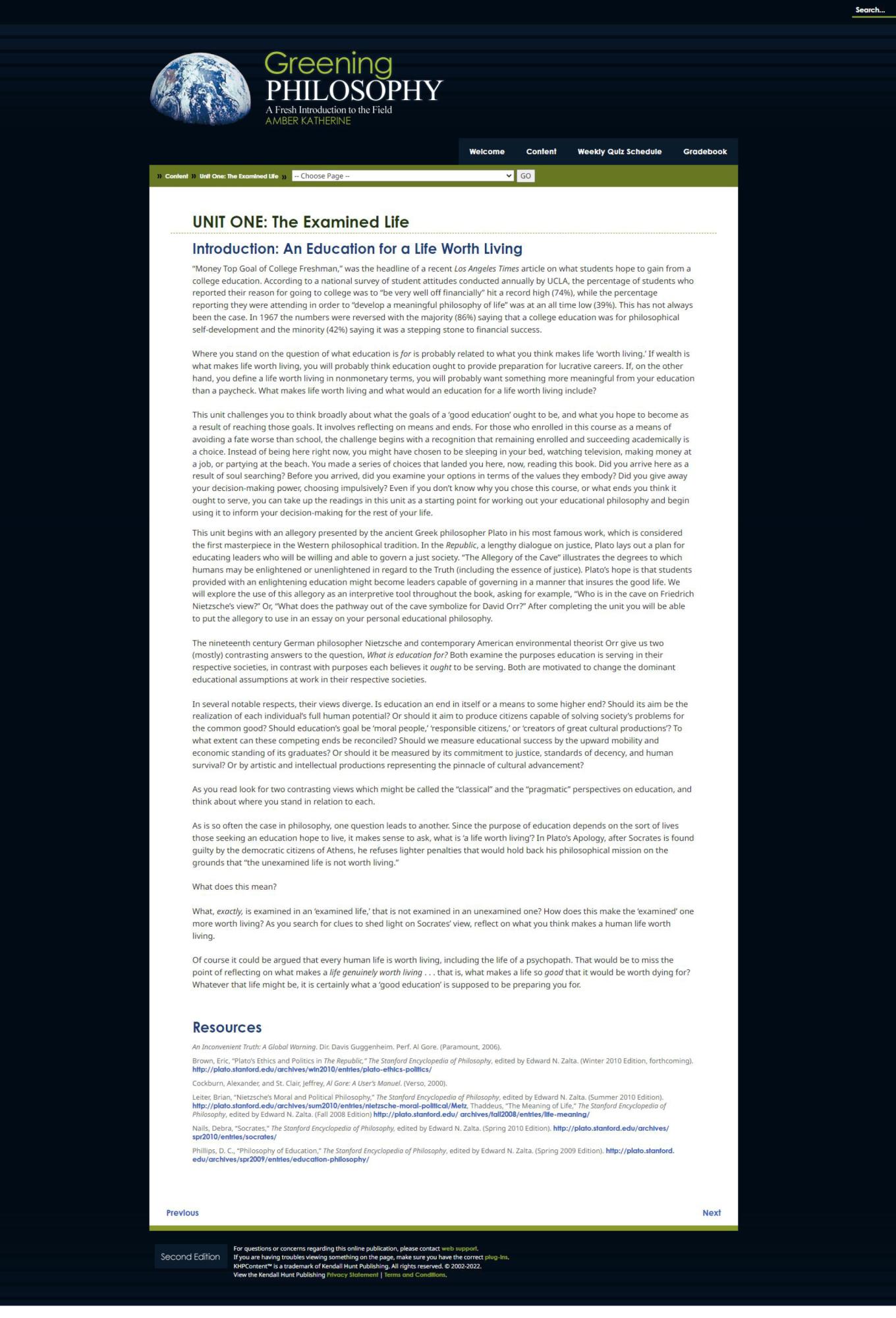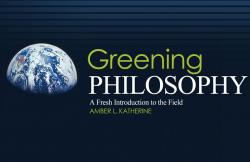Greening Philosophy: A Fresh Introduction to the Field
Author(s): Amber L Katherine
Edition: 1
Copyright: 2011
This innovative philosophy reader offers a practical, engaging introduction to the Western philosophical tradition with the earth in mind. Like other introductory texts, Greening Philosophy provides classic and contemporary readings in philosophy’s three core areas: metaphysics, epistemology and ethics. Rather than treating these areas as separate realms of inquiry, their relations are revealed through the project of understanding and solving our global environmental problems. This concrete, real world starting point is a refreshing relief for students ready for study that makes a difference. The text ends with reflection and deliberation on “global citizenship” for the good life.
A Green Introduction to Philosophy
Reading and Writing Philosophy for a Change
Unit One: The Examined Life
Introduction: An Education for a Life Worth Living
Philosophy’s Origin Story (Plato Allegory)
Classical Educational Philosophy (Nietzsche, On the Future)
Pragmatic Educational Philosophy (David Orr, What is Education)
The Examined Life: Gadfly (Plato Apology)
The Unexamined Life: Sophist (Plato Republic)
Think: (Al Gore Our Purpose)
Unit Two: Reality
Introduction to Greening Metaphysics
Soul: Transcendent(Plato, Phaedo)
Soul: Immanent, Teleological(Aristotle, De Anima)
Monotheism: Cosmological Argument(Thomas Aquinas, Summa Theologica)
Critic of Monotheism(Lynn White, The Historical Roots)
Dualism Part 1 (Rene Descartes, Meditation)
Dualism Part 2 (Rene Descartes, A Discourse)
Monism Part 1 Darwin (Charles Darwin, On the Origin of the Species)
Monism Part 2 Dennett (Darwin’s Dangerous Idea)
Monism Part 3 Capra (The New Physics)
Nihilism: Existentialism Part 1 Nietzsche (What is Noble?)
Nihilism: Existentialism Part 2 Nietzsche (The Gay Science)
Nihilism: Existentialism Part 3 Satre (Nausea)
Unit Three: Knowledge
Introduction to Greening Epistemology
Teleological Explanation Aristotle (Physics)
Objectivity: Rationalism Rene Descartes Part 1 (Meditations on First Philosophy)
Objectivity: Rationalism Rene Descartes Part 2 (A Discourse on the Method)
Objectivity: Empiricism John Locke (Essay Concerning Human Understanding)
Skepticism David Hume (An Enquiry Concerning Human Understanding)
Skepticism Robert Kirkman (The Nature of Nature)
Skepticism Karl Marx and Friedrich Engels (The German Ideology)
Subectivity & Intersubjectivity. Friedrich Nietzsche Part 1 (The Will to Power as Knowledge)
Subectivity & Intersubjectivity. Friedrich Nietzsche Part 2 (On the Genealogy of Morals)
Subectivity & Intersubjectivity David Abram (Spell of the Sensuous)
Subectivity & Intersubjectivity Plumwood (Rationalism and the Ambiguity of Science)
Subectivity & Intersubjectivity John Dryzek
Unit Four: Values
Introduction to Greening Global Citizenship
Global Predicament Garrett Hardin
Global Predicament Mary Midgley
Cosmopolitanism Immanuel Kant
Cosmopolitanism The Universal Declaration of Human Rights
Cosmopolitanism The Earth Charter
Cosmopolitan Advocates Leonardo Boff
Cosmopolitan Advocates Aldo Leopold
Cosmopolitan Advocates Peter Singer
Cosmopolitan Critics Victoria Davion
Cosmopolitan Critics Vandana Shiva
Cosmopolitan Critics Sherilyn MacGregor
Cosmopolitan Critics Partick Curry
Amber L. Katherine is professor of philosophy at Santa Monica College. She holds a B.S. in Political Science from the University of Illinois and a Ph.D. in Philosophy from Michigan State University. She has been teaching philosophy full time for fifteen years. Like Socrates and Nietzsche, her teaching mission is to keep it real, life-affirming and relevant. SMC faculty website: http://homepage.smc.edu/katherine_amber/

This innovative philosophy reader offers a practical, engaging introduction to the Western philosophical tradition with the earth in mind. Like other introductory texts, Greening Philosophy provides classic and contemporary readings in philosophy’s three core areas: metaphysics, epistemology and ethics. Rather than treating these areas as separate realms of inquiry, their relations are revealed through the project of understanding and solving our global environmental problems. This concrete, real world starting point is a refreshing relief for students ready for study that makes a difference. The text ends with reflection and deliberation on “global citizenship” for the good life.
A Green Introduction to Philosophy
Reading and Writing Philosophy for a Change
Unit One: The Examined Life
Introduction: An Education for a Life Worth Living
Philosophy’s Origin Story (Plato Allegory)
Classical Educational Philosophy (Nietzsche, On the Future)
Pragmatic Educational Philosophy (David Orr, What is Education)
The Examined Life: Gadfly (Plato Apology)
The Unexamined Life: Sophist (Plato Republic)
Think: (Al Gore Our Purpose)
Unit Two: Reality
Introduction to Greening Metaphysics
Soul: Transcendent(Plato, Phaedo)
Soul: Immanent, Teleological(Aristotle, De Anima)
Monotheism: Cosmological Argument(Thomas Aquinas, Summa Theologica)
Critic of Monotheism(Lynn White, The Historical Roots)
Dualism Part 1 (Rene Descartes, Meditation)
Dualism Part 2 (Rene Descartes, A Discourse)
Monism Part 1 Darwin (Charles Darwin, On the Origin of the Species)
Monism Part 2 Dennett (Darwin’s Dangerous Idea)
Monism Part 3 Capra (The New Physics)
Nihilism: Existentialism Part 1 Nietzsche (What is Noble?)
Nihilism: Existentialism Part 2 Nietzsche (The Gay Science)
Nihilism: Existentialism Part 3 Satre (Nausea)
Unit Three: Knowledge
Introduction to Greening Epistemology
Teleological Explanation Aristotle (Physics)
Objectivity: Rationalism Rene Descartes Part 1 (Meditations on First Philosophy)
Objectivity: Rationalism Rene Descartes Part 2 (A Discourse on the Method)
Objectivity: Empiricism John Locke (Essay Concerning Human Understanding)
Skepticism David Hume (An Enquiry Concerning Human Understanding)
Skepticism Robert Kirkman (The Nature of Nature)
Skepticism Karl Marx and Friedrich Engels (The German Ideology)
Subectivity & Intersubjectivity. Friedrich Nietzsche Part 1 (The Will to Power as Knowledge)
Subectivity & Intersubjectivity. Friedrich Nietzsche Part 2 (On the Genealogy of Morals)
Subectivity & Intersubjectivity David Abram (Spell of the Sensuous)
Subectivity & Intersubjectivity Plumwood (Rationalism and the Ambiguity of Science)
Subectivity & Intersubjectivity John Dryzek
Unit Four: Values
Introduction to Greening Global Citizenship
Global Predicament Garrett Hardin
Global Predicament Mary Midgley
Cosmopolitanism Immanuel Kant
Cosmopolitanism The Universal Declaration of Human Rights
Cosmopolitanism The Earth Charter
Cosmopolitan Advocates Leonardo Boff
Cosmopolitan Advocates Aldo Leopold
Cosmopolitan Advocates Peter Singer
Cosmopolitan Critics Victoria Davion
Cosmopolitan Critics Vandana Shiva
Cosmopolitan Critics Sherilyn MacGregor
Cosmopolitan Critics Partick Curry
Amber L. Katherine is professor of philosophy at Santa Monica College. She holds a B.S. in Political Science from the University of Illinois and a Ph.D. in Philosophy from Michigan State University. She has been teaching philosophy full time for fifteen years. Like Socrates and Nietzsche, her teaching mission is to keep it real, life-affirming and relevant. SMC faculty website: http://homepage.smc.edu/katherine_amber/


